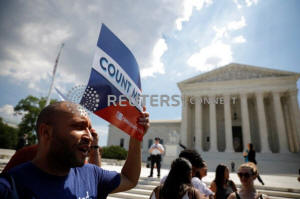|
Trump fumes as Supreme Court blocks
census citizenship question
 Send a link to a friend
Send a link to a friend
 [June 28, 2019]
By Lawrence Hurley and Andrew Chung [June 28, 2019]
By Lawrence Hurley and Andrew Chung
WASHINGTON (Reuters) - The U.S. Supreme
Court on Thursday handed President Donald Trump a stinging defeat,
blocking his contentious citizenship question planned for the 2020
census because officials gave a "contrived" rationale and prompting
Trump to suggest an extraordinary delay in the constitutionally mandated
population count.
Conservative Chief Justice John Roberts wrote the 5-4 ruling, joined by
the court's four liberals, that will make it difficult for the Trump
administration to add the query even if officials offer a new
explanation for its need, with the clock ticking toward the deadline for
printing the census forms.
The court upheld a key part of a federal judge's January decision
barring the question in a victory for a group of states including New
York and immigrant rights organizations that challenged the legality of
the administration's plan.
Critics have called the citizenship question a Republican ploy to scare
immigrants into not taking part in the decennial population count and
engineer an undercount in Democratic-leaning areas with high immigrant
and Latino populations. That would benefit non-Hispanic whites and help
Trump's fellow Republicans gain seats in the U.S. House of
Representatives and state legislatures, the critics said.
Trump said he is exploring whether the census, which the U.S.
Constitution requires be carried out every 10 years, can be delayed.

"I have asked the lawyers if they can delay the Census, no matter how
long, until the United States Supreme Court is given additional
information from which it can make a final and decisive decision on this
very critical matter," Trump wrote on Twitter.
The census launch date - April 1 - is written into a federal law called
the Census Act, known as Title 13. To delay the 2020 census without
running afoul of federal law would require Congress to change the law,
according to Margo Anderson, a U.S. census historian and professor at
the University of Wisconsin at Milwaukee. Delaying the census by
executive action would be unprecedented, Anderson added.
Trump's administration has told the courts that its rationale for adding
the question was to better enforce a law that protects the voting rights
of racial minorities. Critics called that rationale a pretext, with the
Supreme Court's majority embracing that theory.
Roberts said that under a U.S. law called the Administrative Procedure
Act, the federal government is required to give a reasoned explanation
for its actions. Roberts said the sole stated rationale - enforcement of
the Voting Right Act - "seems to have been contrived" and was "more of a
distraction."
"We are presented, in other words, with an explanation for agency action
that is incongruent with what the record reveals about the agency's
priorities and decision-making process," Roberts wrote.
"Accepting contrived reasons would defeat the purpose of the
enterprise," Roberts added.
The court ruled against the challengers in a separate 5-4 vote, with all
the conservative justices in the majority, that the Constitution does
not in theory prevent the administration or a future one from adding a
citizenship question.
As part of the ruling issued on the last day of the court's current
term, the justices sent the issue back to the Commerce Department for it
to decide whether to provide a different rationale for requiring people
taking part in the census to declare whether they are citizens.
Such a determination from a federal agency normally would take weeks or
months. The administration previously said census forms need to be
printed in the coming days.
"There is really no time," said Dale Ho, a lawyer with the American
Civil Liberties Union, one of the challengers.
Jason Torchinsky, a lawyer and Republican redistricting strategist, said
the deadline could be extended to the fall, enabling the Supreme Court
to review the new decision.
"They don't need to redo the entire administrative process, they just
need to better justify what they did, in a way that can satisfy the
Supreme Court," Torchinsky said.
Justice Department spokeswoman Kelly Laco said the administration is
disappointed by the Supreme Court's decision.
[to top of second column]
|

A protester holds a sign outside the U.S. Supreme Court where the
court ruled that U.S. President Donald Trump's administration did
not give an adequate explanation for its plan to add a citizenship
question to the 2020 census, delivering a victory to New York state
and others challenging the proposal in Washington, U.S., June 27,
2019. REUTERS/Carlos Barria

The census is used to allot seats in the U.S. House and distribute
some $800 billion in federal funds. Opponents have said the question
would instill fear in immigrant households that the information
would be shared with law enforcement, deterring them from taking
part.
Further muddying the waters, there is also ongoing litigation in
lower courts over recently unearthed evidence that the challengers
have said reveals an illegal discriminatory motive by the
administration for adding the question, which the high court could
yet weigh in on.
In a dissenting opinion, conservative Justice Clarence Thomas wrote
that adding a citizenship question is "legally sound" and described
the ruling against Trump as "an aberration."
Citizenship has not been asked of all households since the 1950
census, featuring since then only on questionnaires sent to a
smaller subset of the population.
SETBACK FOR TRUMP
The ruling marked the first major setback for Trump in a ruling in a
case argued at the Supreme Court, although both of Trump's
appointees, Justices Neil Gorsuch and Brett Kavanaugh, voted in
favor of his administration. Roberts was joined by liberal Justices
Ruth Bader Ginsburg, Stephen Breyer, Sonia Sotomayor and Elena Kagan.
The Supreme Court had handed Trump some major victories since he
took office in 2017, in particular a June 2018 ruling upholding his
travel ban targeting people from several Muslim-majority countries.
The court in January also let Trump's policy barring many
transgender people from the U.S. military go into effect.
Manhattan-based U.S. District Judge Jesse Furman ruled on Jan. 15
that the Commerce Department's decision to add the question violated
the Administrative Procedure Act. Federal judges in Maryland and
California also have issued rulings to block the question.
Furman said the evidence showed that Commerce Secretary Wilbur Ross
concealed his true motives for adding the question and that he and
his aides had convinced the Justice Department to request a
citizenship query.

The Census Bureau's own experts estimated that households
corresponding to 6.5 million people would not respond to the census
if the citizenship question were asked.
While only U.S. citizens can vote, non-citizens comprise an
estimated 7 percent of the population.
Evidence surfaced in May that the challengers said showed that the
administration's plan to add a citizenship question was intended to
discriminate against racial minorities.
Documents created by Republican strategist Thomas Hofeller, who died
last year, showed he was instrumental behind the scenes in
instigating the addition of the question. He was an expert in
drawing electoral district boundaries that maximize Republican
chances of winning congressional elections.
Hofeller concluded in a 2015 study that asking census respondents
whether they are American citizens "would clearly be a disadvantage
to the Democrats" and "advantageous to Republicans and Non-Hispanic
Whites" in redrawing electoral districts based on census data.
Hofeller suggested the voting rights rationale in the newly
disclosed documents.
The Trump administration called the newly surfaced evidence
"conspiracy theory."
(Reporting by Lawrence Hurley; Additional reporting by Andrew Chung,
Nick Brown and David Shepardson and Bryan Pietsch; Editing by Will
Dunham)
[© 2019 Thomson Reuters. All rights
reserved.]
Copyright 2019 Reuters. All rights reserved. This material may not be published,
broadcast, rewritten or redistributed.
Thompson Reuters is solely responsible for this content. |